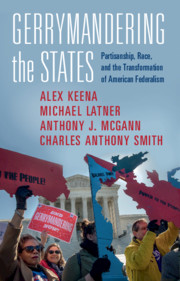Redistricting reformers have proposed many solutions to the problem of partisan gerrymandering, but they all require either bipartisan consensus or the agreement of both parties on the legitimacy of a neutral third party to resolve disputes. In this paper, we propose a new method for drawing district maps, the Define–Combine Procedure, that substantially reduces partisan gerrymandering without requiring a neutral third party or bipartisan agreement. One party defines a map of  $2N$ equal-population contiguous districts. Then the second party combines pairs of contiguous districts to create the final map of N districts. Using real-world geographic and electoral data, we employ simulations and map-drawing algorithms to show that this procedure dramatically reduces the advantage conferred to the party controlling the redistricting process and leads to less-biased maps without requiring cooperation or non-partisan actors.
$2N$ equal-population contiguous districts. Then the second party combines pairs of contiguous districts to create the final map of N districts. Using real-world geographic and electoral data, we employ simulations and map-drawing algorithms to show that this procedure dramatically reduces the advantage conferred to the party controlling the redistricting process and leads to less-biased maps without requiring cooperation or non-partisan actors.
